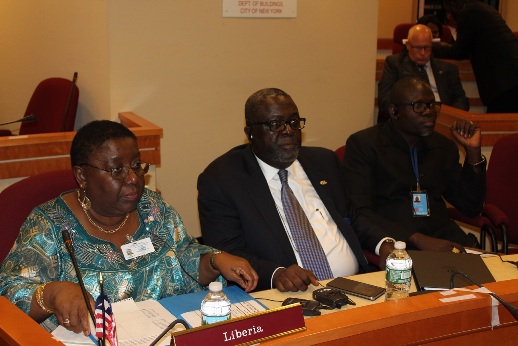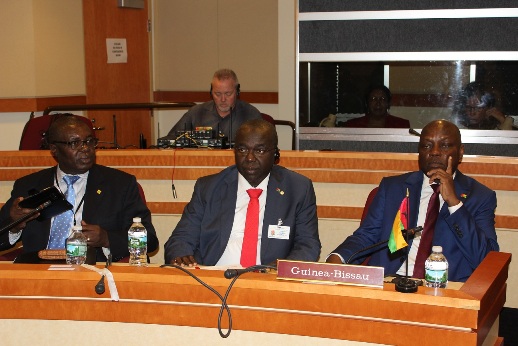
(NEW YORK, U.S.A. – Tuesday, September 20, 2016) ECOWAS Heads of State and Government have agreed to a plan to end the crisis in Guinea Bissau including modalities for the gradual withdrawal of the ECOWAS Military Intervention Force in Guinea Bissau (ECOMIB).According to a dispatch from New York, the agreement was reached at an Extraordinary Meeting of ECOWAS Heads of State and Government on Tuesday, September 20, on the margins of the 71st session of the United Nations General Assembly. The meeting discussed the next steps towards the broad implementation of the plan’s timeframe, and resource mobilization to begin to support development work in the country. At the meeting chaired by Liberia’s President, Madam Ellen Johnson Sirleaf, current chair of the sub-regional organization, the Heads of State and Government were informed of the conclusions of the presidential mission to Guinea Bissau on September 10, led by the ECOWAS-designate mediator, President of Guinea, His Excellency Professor Alpha Conde and assisted by the President of Sierra Leone, His Excellency Dr. Ernest Bai Koroma.Welcoming her colleagues, representatives and partners to the meeting, the Liberian leader briefed them on the various phases of negotiations, first by the ministerial mission, complimented by the President of the ECOWAS Commission that prepared the grounds for the mediating committee, headed by Professor Conde and his colleague, Dr. Koroma.ECOWAS Heads of State and Government and representatives of various countries and organizations, making remarks, including the President of Guinea Bissau, His Excellency, Mr. José Mário Vaz, expressed optimism that all parties to the crisis are committed to the plan and are prepared to see its successful implementation; while international partners have given their full commitment to ensuring that the plan is realized.The plan to end the crisis, validated by the ECOWAS Authority of Heads of State and Government, focuses on six-points including: bringing together all stake holders for an inclusive roundtable dialogue based on a platform of the 15 dissident members of parliament, PAIGC, PRS, other political parties, civil society and religious and traditional leaders; forming an inclusive consensus government to implement the platform set up by the roundtable, to lead the country until the next legislative elections in 2018; and undertaking reforms of the Constitution, electoral laws, charter of political parties, the territorial government and strengthening the judicial system for greater credibility.
At the meeting chaired by Liberia’s President, Madam Ellen Johnson Sirleaf, current chair of the sub-regional organization, the Heads of State and Government were informed of the conclusions of the presidential mission to Guinea Bissau on September 10, led by the ECOWAS-designate mediator, President of Guinea, His Excellency Professor Alpha Conde and assisted by the President of Sierra Leone, His Excellency Dr. Ernest Bai Koroma.Welcoming her colleagues, representatives and partners to the meeting, the Liberian leader briefed them on the various phases of negotiations, first by the ministerial mission, complimented by the President of the ECOWAS Commission that prepared the grounds for the mediating committee, headed by Professor Conde and his colleague, Dr. Koroma.ECOWAS Heads of State and Government and representatives of various countries and organizations, making remarks, including the President of Guinea Bissau, His Excellency, Mr. José Mário Vaz, expressed optimism that all parties to the crisis are committed to the plan and are prepared to see its successful implementation; while international partners have given their full commitment to ensuring that the plan is realized.The plan to end the crisis, validated by the ECOWAS Authority of Heads of State and Government, focuses on six-points including: bringing together all stake holders for an inclusive roundtable dialogue based on a platform of the 15 dissident members of parliament, PAIGC, PRS, other political parties, civil society and religious and traditional leaders; forming an inclusive consensus government to implement the platform set up by the roundtable, to lead the country until the next legislative elections in 2018; and undertaking reforms of the Constitution, electoral laws, charter of political parties, the territorial government and strengthening the judicial system for greater credibility.
 From an analysis of the country’s 43-year independence, according to the mediating team, it emerged that no elected Head of state has been able to complete a term in office and no government has implemented its programme in a term. As such, they have suggested that the roles of the executive, legislative and judiciary need to be re-defined.Part of the plan include putting in place a three-level monitoring and evaluation mechanism by: converting the office of the ECOWAS Special Envoy in Guinea Bissau to a Permanent Office with a team to monitor the programme of the platform; enhancing the role of mediator with involvement in the reconciliation of the different parties in the conflict; and instituting a ministerial committee under the auspices of the Chair of ECOWAS Council of Minister, to conduct periodic assessment (quarterly) of the implementation of the platform’s programme.Also, implementing the Defense and Security Reform Programme following a review in Abuja, Nigeria involving the programme coordinator and the Guinea Bissau Minister of Defense; as well as the gradual withdrawal of ECOMIL forces over a six-month period, after training a contingent of the Guinea Bissau army to replace ECOMIL in the protection of institutions and senior government officials.ECOWAS Heads of State and Government called on the PAIGC, the 15 dissident PAIGC members of parliament, civil society, religious and traditional leaders and all citizens of Guinea Bissau to provide steadfast support for the consistent implementation of the plan to end the crisis.On June 4, this year, a decision was taken at the 49th Meeting of the Authority of ECOWAS Heads of State and Government to re-energize the ECOWAS initiative in Guinea Bissau by deploying a mission to that country
From an analysis of the country’s 43-year independence, according to the mediating team, it emerged that no elected Head of state has been able to complete a term in office and no government has implemented its programme in a term. As such, they have suggested that the roles of the executive, legislative and judiciary need to be re-defined.Part of the plan include putting in place a three-level monitoring and evaluation mechanism by: converting the office of the ECOWAS Special Envoy in Guinea Bissau to a Permanent Office with a team to monitor the programme of the platform; enhancing the role of mediator with involvement in the reconciliation of the different parties in the conflict; and instituting a ministerial committee under the auspices of the Chair of ECOWAS Council of Minister, to conduct periodic assessment (quarterly) of the implementation of the platform’s programme.Also, implementing the Defense and Security Reform Programme following a review in Abuja, Nigeria involving the programme coordinator and the Guinea Bissau Minister of Defense; as well as the gradual withdrawal of ECOMIL forces over a six-month period, after training a contingent of the Guinea Bissau army to replace ECOMIL in the protection of institutions and senior government officials.ECOWAS Heads of State and Government called on the PAIGC, the 15 dissident PAIGC members of parliament, civil society, religious and traditional leaders and all citizens of Guinea Bissau to provide steadfast support for the consistent implementation of the plan to end the crisis.On June 4, this year, a decision was taken at the 49th Meeting of the Authority of ECOWAS Heads of State and Government to re-energize the ECOWAS initiative in Guinea Bissau by deploying a mission to that country

